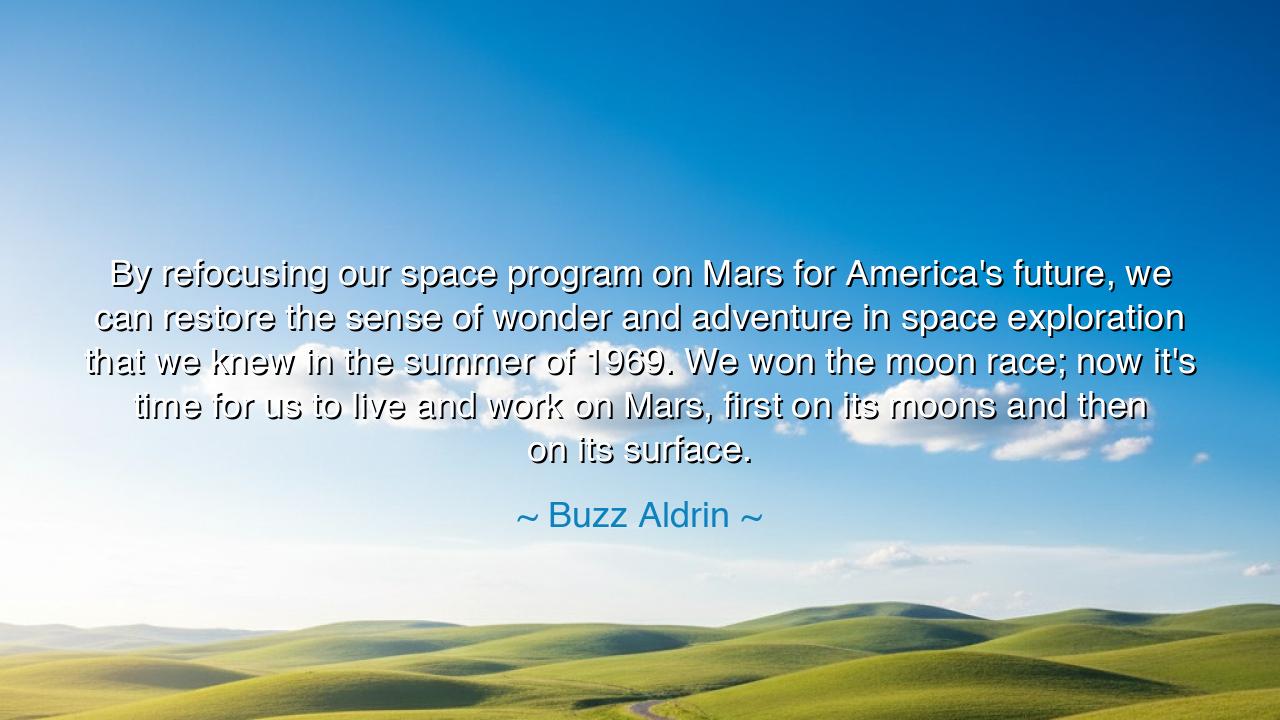
By refocusing our space program on Mars for America's future, we
By refocusing our space program on Mars for America's future, we can restore the sense of wonder and adventure in space exploration that we knew in the summer of 1969. We won the moon race; now it's time for us to live and work on Mars, first on its moons and then on its surface.






In the grand expanse of human history, there are moments when our collective imagination and determination soar to new heights, propelling us beyond the confines of what we once believed possible. Buzz Aldrin, a man whose name is synonymous with the great triumphs of space exploration, speaks to the heart of humanity’s eternal quest for the unknown: "By refocusing our space program on Mars for America's future, we can restore the sense of wonder and adventure in space exploration that we knew in the summer of 1969. We won the moon race; now it's time for us to live and work on Mars, first on its moons and then on its surface." These words echo with the powerful legacy of the past while calling us to venture further, to embrace new frontiers, and to continue the adventure that began when humanity first looked to the stars.
In the ancient world, exploration was seen as the pinnacle of human ambition, a reflection of both our curiosity and our desire to understand the cosmos. The great Greek philosopher Plato spoke of the philosopher’s journey as one of seeking to explore the true nature of existence, to uncover what lies beyond the visible world. In the same way, the astronauts of the 1960s—like Aldrin and Neil Armstrong—embarked on a mission not only to explore the physical realm but to extend the boundaries of human consciousness. Their journey to the Moon was not merely about planting a flag on new soil but about proving that humanity could reach the unreachable. Just as the ancients sought the edges of their known world, we too, in this modern age, seek the edges of our universe.
The Moon, though a majestic and awe-inspiring achievement, is but a stepping stone in the grand journey of space exploration. To truly understand the significance of Aldrin’s call to focus on Mars, we must look back to the great navigators and explorers who journeyed to uncharted lands. The Viking explorers, for instance, crossed vast, dangerous seas to find new territories, not because they had mapped every detail of the journey, but because the call of the unknown and the desire for discovery were irresistible. Their willingness to venture into the unknown is mirrored in Aldrin's call to go beyond the Moon and to set our sights on the red planet, Mars. It is the next great frontier, a challenge that demands not just scientific achievement but the collective will to push beyond what is known.
Consider the story of Christopher Columbus, who sailed into the vast unknown with little more than the belief that something great awaited beyond the horizon. Though met with doubt and uncertainty, Columbus's courage changed the course of history. He sought to reach the East, but in doing so, discovered new lands that would shape the future of the world. In the same way, Aldrin’s call for humanity to turn its attention to Mars is a call for us to leave behind the comfort of what we know and pursue the unimaginable. Mars represents both the unknown and the potential for human evolution—a new chapter in our collective story, where the mysteries of space can once again awaken the same sense of wonder and adventure that gripped the world in 1969.
In the early days of space exploration, humanity was driven by a shared vision—to become a multi-planetary species, to reach out to the stars and carve our place in the vastness of the universe. But as Aldrin suggests, that vision has since faded, and we have become complacent, as if the Moon is the final destination. Yet, the true legacy of the Apollo program was not in the Moon landing itself, but in the belief that we could do the impossible. Just as the ancient explorers never stopped searching, space exploration must continue, with Mars as the next destination—a place where humanity can live and work, where we can push the boundaries of what is possible and create a new future.
The lesson here is profound: we must never stop reaching for the stars. Just as the ancient heroes embarked on great quests to uncover the unknown, we too must embrace the unknown and look toward the future with the same courage and hope. The future of humanity lies not in the comfort of what we have already achieved, but in the boldness to dream of new worlds, to push past our limits, and to dare to settle on Mars. It is in these great endeavors that we find our true purpose, and through the pursuit of the impossible, we shape the future for generations to come.
In your own life, consider where you might apply this same sense of adventure and boldness. What are the great frontiers in your life that remain unexplored? Mars symbolizes the unreachable, but it is also a call to action—to pursue your own dreams, to reach for the stars in your own unique way. Just as Aldrin calls us to go beyond the Moon, we too must continually seek to move forward, to explore, and to expand the boundaries of our potential.






AAdministratorAdministrator
Welcome, honored guests. Please leave a comment, we will respond soon